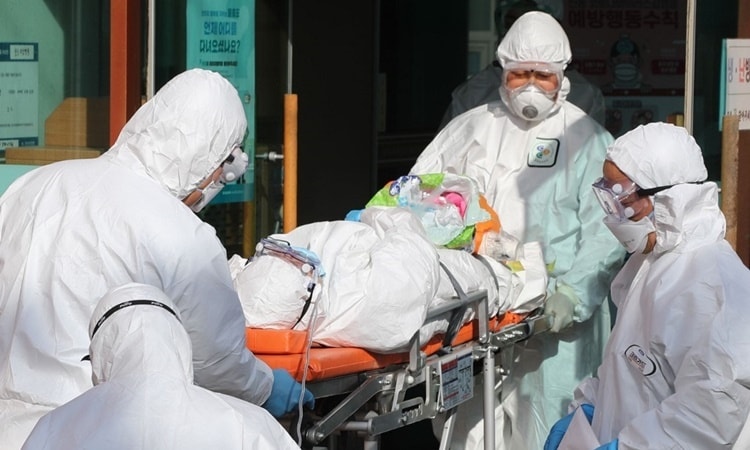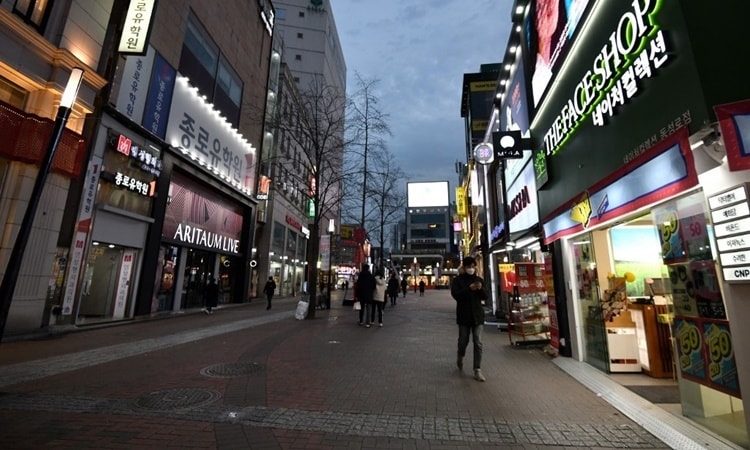Factors that make it difficult for Korea to control nCoV
Shincheonji's secretive activities and the government's response are believed to be the main reasons why South Korea has had difficulty controlling the Covid-19 epidemic.
Buses and subways, usually packed with people, were unusually deserted in Seoul, South Korea, on Monday morning, a sign of people's anxiety over the Covid-19 outbreak in the country.
South Korea today recorded 60 new cases of nCoV infection, bringing the total number of infections to 893, of which 8 people have died, becoming the second largest outbreak in the world, only after China, which has recorded nearly 78,000 nCoV infections with more than 2,650 deaths.
 |
| Medical staff move a patient suspected of being infected with nCoV at Daenam Hospital in Cheongdo County, near Daegu City, on February 21. Photo: AFP. |
As concerns over Covid-19 grow, South Korean public opinion is increasingly focused onShincheonji (New Heaven and Earth) sect, as more than 50% of South Korea's nCoV infections are linked to members of this sect. More than 9,000 sect followers are being placed in quarantine, according to government data.
After a period of silence since the outbreak, Shincheonji posted a video on its website two days ago. In the video, a man identifying himself as Kim Shi-mo said that Shincheonji was doing everything in its power to prevent the spread of the virus, including canceling activities at its churches.
He called on individuals and media outlets not to spread false or unverified information about Shincheonji. "We, like other Koreans, are victims of the epidemic," Kim said.
However, Shincheonji could not avoid being suspected after a 61-year-old female member of the sect, known as "Patient 31", refused to be tested for nCoV twice despite having symptoms. She was confirmed positive for the virus on February 18 after attending the Shincheonji church four times, coming into contact with dozens, even hundreds of people.
Shincheonji has been considered a cult that spreads superstition since 2007, when a major South Korean television channel aired a documentary about the sect's activities, in which followers claimed that Shincheonji leader Lee Man-hee was "immortal".
Experts say Shincheonji's shady activities and its followers gathering in large groups to pray make it more difficult to prevent the spread of the virus.
 |
| A shopping street in Daegu on February 24. Photo: AFP. |
"Shincheonji members tend to hide their identities, leaving their friends and even their families unaware that they are members of the sect. Now, the government is unable to contact hundreds of Shincheonji members who attended the church in Daegu," said Ji-il Tark, a theology professor. "Revealing that they are Shincheonji members can be extremely difficult, because it means they have lied to their relatives. Therefore, these relatives are at risk of being infected without knowing it. This is the scariest scenario."
On the other hand, the content that Shincheonji propagates can also cause believers to be less vigilant against the virus.
"The cult operates quite secretly and superstitiously. They believe their leader is immortal and is promised eternal life," said Peter Daley, an English lecturer at a university in Seoul who specializes in tracking cults.
In addition to pointing the finger at the Shincheonji Church of Jesus, many South Koreans have also criticized the government for its efforts to combat the pandemic. They accuse the Moon Jae-in administration of downplaying the dangers of Covid-19.
"The epidemic is out of control while the president remains immersed in optimism, declaring that the outbreak will not last long," the Chosun Ilbo newspaper wrote in a commentary. "If we cannot stop the virus, the whole country will be in danger."
"The government must be held accountable for not responding early to the coronavirus," Kim Seung-dong, an opposition politician in Daegu, wrote on Facebook.
Much of the criticism has been directed at the government’s decision not to ban all Chinese nationals from entering South Korea. A petition on the South Korean presidential office website has received 760,000 signatures, calling on the government to follow North Korea’s example and seal off its borders.
China is South Korea's largest trading partner, so some have accused President Moon of failing to protect public health out of concern that a comprehensive entry ban would displease Beijing.
Those in the affected areas of South Korea now have no choice but to adapt. Jung Tae-min, a student from Daegu, was unable to start his first year of college on schedule due to concerns over the coronavirus, and his school’s career orientation day was also canceled.
"My friends and family are constantly talking about the coronavirus, and there are generally very few people on the streets right now," Jung said. "Everyone who goes out is wearing a mask. Stores are selling masks in limited quantities or they're out of them. Some big department stores are closed. Otherwise, everything is pretty normal."



.jpg)
![[Infographics] 5 biện pháp phòng, chống dịch COVID-19 [Infographics] 5 biện pháp phòng, chống dịch COVID-19](https://bna.1cdn.vn/thumbs/540x360/2025/05/22/anh-2.jpg)

-5b8619d675cc4f38cedd8c853332ddab.jpg)

